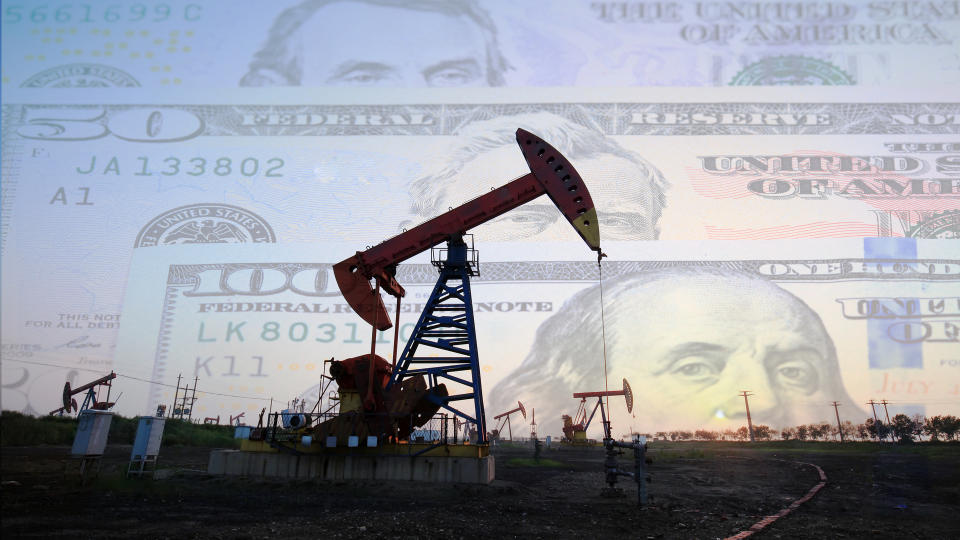The Senate Reports Oil and Gas Prices Are Not Impacted by Corporate Greed – These Experts Say Otherwise

A new report by the Joint Economic Committee Republicans contends that gas prices — which have increased exponentially over the past few months and are a major contributing factor to the four-decade high inflation — are due to supply and demand imbalances, with the Russia-Ukraine war playing a minimal part.
Learn: Americans Largely Blame Government and Big Oil for Inflation as Over Half Dip Into Savings or Borrow Money
Gas Cost Fallout: Major Oil Companies Amass $205B in 2021 Profits, Draw Criticism for ‘Not Flipping the Switch’ Fast Enough
The report also argues that there is no price gouging by oil and gas companies.
However, some experts disagree with the premise, saying that gas and oil companies are using market disruptions, caused by the pandemic recovery and the Russian invasion of Ukraine, to raise prices above competitive levels.
“These claims are not supported by the evidence,” ranking member Sen. Mike Lee wrote in the July 26 report.
The report finds that the price per gallon of gasoline increased from $2.34 in January 2021 to a peak of $5.11 in June 2022, the highest level on record and that prices remain elevated at more than $4.50 per gallon in July.
“We estimate that the Russian invasion of Ukraine explains 30% of the increase in gasoline prices from January 2021 through June 2022. The remaining 70% of the increase is due to pre-existing price trends arising from suppressed supply of oil production and surging demand,” reads the report.
“There is no evidence of oil and gas firms engaging in collusion or price gouging to raise prices during the current crisis. U.S. oil and gas producers, refiners, and retailers operate in competitive markets that preclude this possibility,” it continued.
In contrast, a report by non-profit organization Accountable.US shows that the top oil and gas companies amassed $41 billion during the first three months of 2022 and on average, the companies made $1.2 billion more with many even doubling their profits when comparing the first quarters of 2022 and 2021.
Bloomberg also reported that Shell is set to report a $1 billion gain in refining results, while Exxon is “expected to make more in the second quarter than the previous nine combined.”
Jordan Schreiber, Director of Energy and Environment at Accountable.US, told GOBankingRates that “it’s no coincidence that Big Oil is producing record-breaking profits after they’ve spent months blatantly price gouging American consumers.
“Frankly, the justifications for their predatory pricing fall flat. Even when the price of crude oil fell, the industry dragged its feet to lower its historically high prices and the industry tried to blame the Biden administration for not providing opening up public land for extraction, but the reality is President Biden has approved more drilling permits in his first year than Trump and the industry is sitting on 9,000 unused permits right now,” she said.
“The industry’s unrelenting and unchecked greed allowed them to exploit consumers and squeeze historic levels of profits out of everyday Americans.”
In addition, the Joint Committee report found that U.S. oil production remains 9% below the pre-pandemic levels, which ranks “last in recovery out of the top 10 oil producing countries.”
Chris Cook, senior equity trader and research analyst at Frost Investment Advisors, told GOBankingRates that energy companies are posting record cash flows and profits largely due to the surge in global commodity prices, stemming from the supply imbalances we’ve had since exiting the pandemic.
“Global supply has only become more constrained as it appears that OPEC is now close to production capacity, Russia is sanctioned for the war in Ukraine, and domestically, the focus on the energy transition and ESG has helped contribute to an underinvestment in oil production and refining capacity,” Cook said, adding that increasing domestic production does not happen quickly, nor would it be a magic bullet to solve a global commodity supply issue.
“Unless there is significant demand destruction from slowing economies, the world will continue to fight over a limited amount of molecules, and in turn, support energy prices,” he said.
In addition, the Joint Committee report also notes that “there is no direct evidence from observing local station pricing behavior that retail gasoline firms collude to fix prices.”
John Catsimatidis, chairman and CEO of Red Apple Group — which owns and operates United Oil Refinery and 400 gas stations — as well as chairman and CEO of Gristedes & D’Agostino’s Supermarkets, shared a different view with GOBankingRates, saying that the price of gasoline increases and decreases proportionately with the price of crude oil per barrel.
“When gas station owners were once paying $55 per barrel, and now must pay $120 per barrel, costs at the pump will increase proportionately. However, when President Biden was in Saudi Arabia, and there was speculation that a deal was going to be cut to increase supply, per barrel oil costs dropped to $89 — only to return to near-highs when no deal was announced,” he said.
Catsimatidis added that the largest oil companies, such as Exxon and Chevron, are not owned by one individual, they are owned by many shareholders.
See: Gas & Grocery Prices Are Hurting Americans Most — Here Are 3 Ways To Save
Discover: Gas Prices To Hit $4? Why Downward Trend Likely Won’t Last in ‘Tightest Oil Market’ in Decades
“Their profits make up portions of retirement accounts, pension plans, 401k plans. Criticism is misguided because they are trying to blame one company for their profits, while their profits benefit very many people,” he said.
More From GOBankingRates
This article originally appeared on GOBankingRates.com: The Senate Reports Oil and Gas Prices Are Not Impacted by Corporate Greed – These Experts Say Otherwise
